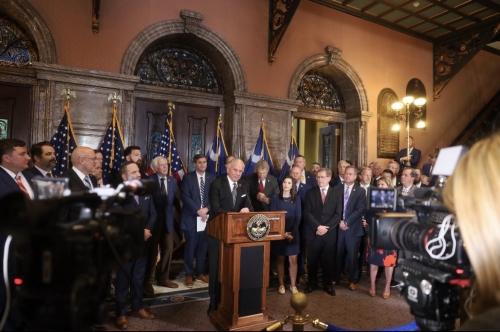No tax bill is perfect. But this one nearly is. Here’s why…
As a CPA and tax professional with over 30 years of experience, I’ve seen firsthand how tax policy impacts people’s lives, businesses, and the broader economy. That’s why I strongly support the proposed income tax cut (H.4216) currently under consideration in South Carolina.
Is it perfect? No. But it’s a strong, responsible step in the right direction — and the criticisms being leveled against it miss the bigger picture.
The Truth About Year One
One concern I’ve heard is that “some people will see their taxes go up in year one.” And yes — that’s true. Anytime you move from a graduated, progressive tax system to a fair, flat tax, some individuals, especially those who previously paid little or no state income tax, may pay slightly more.
In South Carolina, about 44% of our citizens currently pay no state income tax. As Chairman Bannister noted in the subcommittee on H.4216,”We have people earning a million dollars in earned income that are paying zero income tax. And then we have people at the lowest level, ten thousand dollars in income, who are paying more than their fair They’re paying 6.2%.”
As we transition to a fairer, flatter structure, some of those individuals may be asked to contribute, although those at the lowest incomes will still have a deduction. But once the flat rate is fully phased in at 2.49%, the vast majority of South Carolinians will see a tax cut.
It’s simple math — and it’s a more sustainable and stable structure for our tax code moving forward.
And let’s be honest: as conservatives, haven’t we always championed the flat tax as a fairer alternative? A system where everyone pays the same rate — no loopholes, no carve-outs, no games — is a system that treats all taxpayers equally and encourages growth and accountability.
And here’s something else that should excite every taxpayer: this bill sets us on the path to a 2.49% flat tax — the lowest flat income tax rate in the entire nation. That’s not just competitive — that’s transformational leadership. That’s a statement that South Carolina is serious about growth, jobs, and keeping more money in the pockets of its citizens.
Another important reason for the change is the need for a more stable and predictable foundation for calculating state income tax.
By shifting from federal taxable income to federal adjusted gross income (AGI), South Carolina joins the vast majority of other states that already use AGI as their starting point. This change matters because federal taxable income is subject to constant changes, driven by the political whims of whichever administration is in power in Washington, D.C. That volatility makes it difficult for our state leaders to budget accurately or forecast revenues with confidence. Using AGI gives us more control over our own tax code, creates consistency from year to year, and allows for more meaningful comparisons with other states as we compete to attract businesses and hardworking citizens to South Carolina.
Leaving the System As-Is Isn’t an Option
Simply leaving the current system in place means continuing a status quo where 44% of our citizens pay no income tax while many hardworking South Carolinians are stuck paying the highest top income tax rate in the Southeast — higher than the 4% flat tax rate in Michigan, the blue state I escaped from 14 years ago. That’s unacceptable.
Frankly, I’m weary of those who complain but never bring real solutions. Our state’s conservative leaders did the responsible thing — they sought real advice from free market tax experts. The result? A thoughtful, phased approach that has been endorsed by Americans for Tax Reform, a national leader in sound, conservative tax policy. ATR studies tax systems across all 50 states and are tough critics. They know a good bill when they see one. This is a good bill.
No, You Can’t Get to Zero Overnight
I’ve also heard some argue that the goal should be to eliminate the income tax entirely, so we should just do it — skip the gradual step-down and go straight to zero. That sounds bold, but it’s not based in reality, and it’s not fiscally responsible.
The states that currently have no income tax — like Florida, Texas, and Tennessee — didn’t operate without trade-offs. Every single one of them makes up that lost revenue in other ways: through higher property taxes, higher sales taxes, gas taxes, tourism taxes, or industry-specific taxes. Furthermore, while the income tax increase for some in this plan is temporary, alternatives like hikes in sales, property, or gas taxes are rarely—if ever—rolled back once enacted.
Even Mississippi — which just announced a 10-year plan to phase out its income tax — included an increase in its gas tax as part of that proposal. Other tax cutting states in our region have looked to “revenue enhancements” to pay for cuts, like expanding services subject to the state sales tax. H.4216 does not.
Let that sink in: the path to zero is paved with trade-offs. But the only trade-off in the proposed South Carolina tax cut legislation in return for a drastically lower income tax rate on nearly everyone is time.
Each state’s tax system is unique and should reflect its economy, demographics, and revenue needs. There is no one-size-fits-all model — and pretending otherwise is either naïve or misleading.
As the great Thomas Sowell once said, “There are no solutions, only trade-offs.” That’s especially true in tax policy. The question isn’t whether there’s a perfect path — it’s whether we’re choosing a better path. This bill is not only a better path; it’s transformative.
Got a Better Plan? Let’s See It.
To those opposing this bill: If you have a plan to take us from a 6.2% income tax to 0% without raising someone’s taxes or bankrupting the state, let’s see it. Seriously — bring it forward. Because from where I sit, this proposal is the most fiscally responsible, gradual, and honest approach we’ve seen. And it does so without any offsets that raise things like property taxes, sales taxes, or a gas tax to make up for the revenue loss. It is a true tax cut.
And if you think this bill could be improved, great — offer some well-researched amendments. Show us the revenue projections. Let’s have a real conversation, grounded in numbers and economic reality — not slogans or speculation. That’s how good policy is made.
Of course, we should continue to look for ways to cut wasteful spending. At Palmetto Promise, we absolutely believe that. But we should not wait to offer tax relief to hardworking South Carolinians until we’ve identified and eliminated every last penny of inefficiency. We can walk and chew gum at the same time — cut taxes and cut spending in tandem.
The Bigger Vision
South Carolina has an incredible opportunity to lead in the most competitive tax cutting region in America: the Southeast. If we take this step, and if we’re wise with our spending and smart with our growth, we can keep lowering the rate and build a path to zero if we decide that is best.
Like I noted above, just last month Mississippi announced a 10-year goal to eliminate its income tax entirely — and again, that plan included a gas tax increase to help offset revenue loss. We can do better. We can build our own path, and this bill, with no offsets, is our first big leap forward.
Let’s not let perfect be the enemy of good. Let’s be honest about the trade-offs. And let’s have the courage to move toward a tax system that respects taxpayers, grows our economy, and builds a stronger South Carolina for generations to come.





